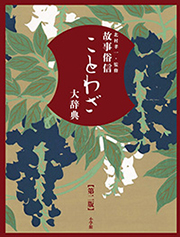JapanKnowledge

The largest dictionary of proverbs in Japan. A total 43,000 entries, augmented with a wide range of example sentences both ancient and modern.
This Great Dictionary of Tradition and Proverbs, the largest of its kind in Japan, is comprised of a total of 43,000 entries which were fully revised 30 years after the first edition was published in 1982.
This Great Dictionary of Tradition and Proverbs, the largest of its kind in
The second edition consists of carefully selected basic proverbs (around 1,000 entries) accompanied by detailed comments and supplementary explanations, enhanced by greatly expanded examples of usage. Around 1,500 new entries have also been added. These consist of a large number of proverbs appearing in the Rigenshu (collection of folk sayings) of early modern Japan, phrases that can be classified as proverbs that have come into existence since the modern period, proverbs that have entered into the Japanese language from the West, lines from senryu (satirical haiku), haiku, and plays that have become proverbs, and so on. The distinct characteristic of this dictionary as a “dictionary of proverbs” is that it has also been strengthened by organizing sayings that are mere idiomatic phrases. In addition, in order to clarify the distinction between proverbs and popular beliefs, the terms “zokushin, zokusetu” (folk beliefs or popular sayings) have been placed next to entries to make them immediately visible. A search can be narrowed down to popular beliefs by entering “zokushin” or “zokusetu” in the search window.
The JapanKnowledge version lists the first word of each proverb entry as a “first-word entry,” making it possible to see a first-word index of proverb entries. Additionally, an index word for each proverb entry is displayed at the end of the main text to immediately enable a re-search using that word.
General editor: Kitamura Yoshikatsu
Editorial committee: Satake Hideo, Takeda Katsuaki, Ito Takao
Editorial committee: Satake Hideo, Takeda Katsuaki, Ito Takao
Contents information
| Original books | 故事俗信 ことわざ大辞典 第二版 |
|---|---|
| Publisher | SHOGAKUKAN Inc. |
| Publication date | February 25,2012 |
| Number of volumes | One volume |
| Book price | ¥19,800 (Pre-tax price ¥18,000+tax10%) |
| Release date | May 10, 2019 |
| Number of entries | 51,478 entries |
| Number of characters | 5,681,882 characters |
| About search | ― |
| Frequency of update | ― |
| Available services |
|
(as of May 2019)